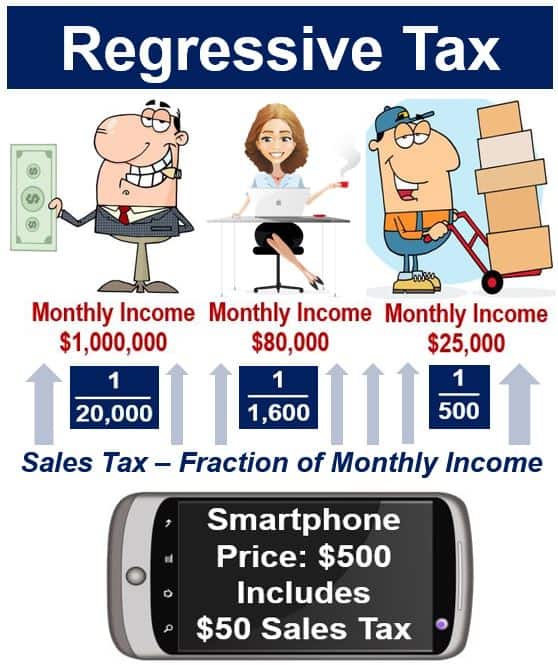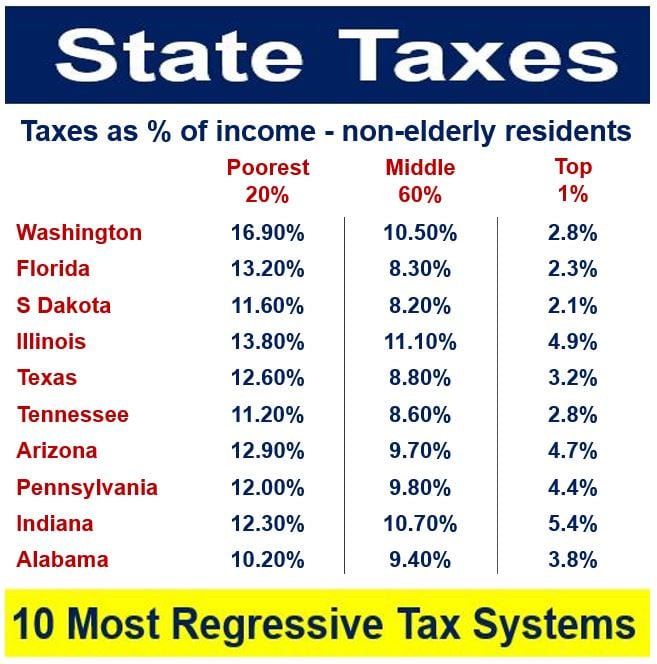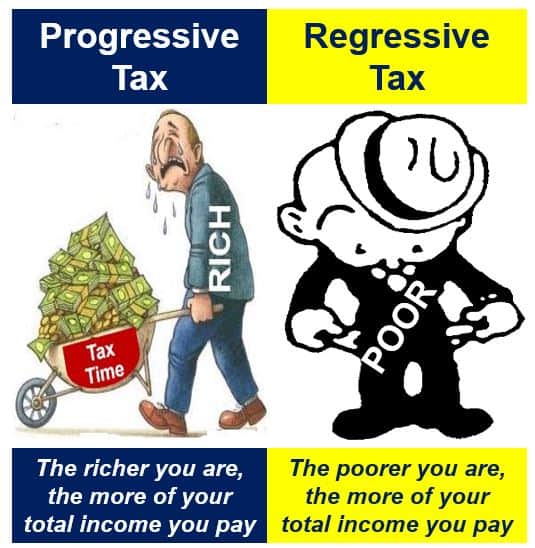Regressive tax refers to a tax which takes a greater proportion of low-wage individuals’ income than from wealthier people. In a regressive tax system, as your income rises, the proportion of that income that you pay in tax declines.
It is the opposite of progressive tax, which takes a higher percentage of rich people’s income compared to that of low earners’ incomes.
In most cases, regressive taxes are applied evenly in all situations, regardless of the individual’s income or ability to pay.
Regressive tax – fair or unfair?
People on low incomes are more severely affected – compared to high-income individuals – by a regressive tax than a progressive one. In some cases, taxing everybody uniformly is fair, but in others it may be deemed as unjust.
 When the three people in this image buy a new smartphone, how much they are taxed – as a proportion of monthly income – varies considerably. Hence, sales tax is an example of a regressive tax – rich people are charged a much smaller percentage of their income than their poorer counterparts.
When the three people in this image buy a new smartphone, how much they are taxed – as a proportion of monthly income – varies considerably. Hence, sales tax is an example of a regressive tax – rich people are charged a much smaller percentage of their income than their poorer counterparts.
For example, if income tax were regressive – with poor people paying a higher percentage of their income in taxes than rich individuals – it would be seen as extremely unfair.
However, sales tax, which is applied uniformly, is seen as fair. The sales tax on a pint of beer is the same, regardless of who buys it.
A rich person does not pay more sales tax on that pint of beer than a low-income individual, even though the tax on that beer represents a higher percentage of the poorer person’s income than that of his or her richer counterpart.
 Besides complaints within these ten US states that taxes are too high, the other is that a regressive flat tax costs each state revenues as income inequality expands. (Image data source: media.chicagomag.com)
Besides complaints within these ten US states that taxes are too high, the other is that a regressive flat tax costs each state revenues as income inequality expands. (Image data source: media.chicagomag.com)
Sales tax – a regressive tax
Tom, who earns $2,000 per month, is friends with Bernadette, who earns $10,000 per month.
Imagine they both go to the supermarket and spend $100 on identical groceries. Sales tax represented $8 (8%) of the $100 they spent.
– $8 is 0.4% – or 1/250 – of Tom’s monthly income.
– $7 is 0.08% – or 1/1250 – of Bernadette’s income.
Sales tax (UK/Ireland: VAT, value-added-tax) represented a much smaller proportion of Bernadette’s income than Tom’s.
Are property taxes regressive?
In most countries, expensive properties are taxed at a higher rate than cheaper ones – the property tax on a $50 million home is usually higher than the tax on a $70,000 house.
So, in that sense, property taxes are not regressive; they are progressive. As only very rich people can afford the $50 million home, that higher tax rate will only affect them, and not individuals on lower incomes.
Most $70,000 properties will be sold to people at the lower end of the socioeconomic ladder – very few billionaires will be among the customer list for $70,000 homes.
 People on lower incomes prefer a progressive tax system, while those on higher incomes prefer a regressive tax system.
People on lower incomes prefer a progressive tax system, while those on higher incomes prefer a regressive tax system.
However, it could also be argued that property taxes are regressive. If the world’s richest person – Bill Gates – buys a $70,000 home, he or she pays the same amount in property tax as Mary Smith the office cleaner.
However, the property tax on that home represents a considerably greater percentage of Ms. Smith’s financial resources than Mr. Gates’.
User fees – regressive tax
User fees are generally considered regressive because people at the bottom of the socioeconomic ladder pay a higher percentage of their income in tax than those in the higher-income groups.
Examples include the fees we pay for parking, admissions to public parks and museums, tolls for tunnels, bridges & roads, and licenses.
Patrick is a successful cosmetic surgeon in New York, he earns approximately $50,000 per month, while his cousin John, a part-time car-park attendant, earns $1,000 per month.
 Bernard ‘Bernie’ Sanders has been a junior US Senator from Vermont since 2007. He has served longer than anybody else in the US Congress. (Image: twitter.com/BernieSanders)
Bernard ‘Bernie’ Sanders has been a junior US Senator from Vermont since 2007. He has served longer than anybody else in the US Congress. (Image: twitter.com/BernieSanders)
When Patrick drives across a specific bridge, he has to pay a $5 toll. John also has to pay $5 to cross that bridge in his car. Five dollars represents a much larger proportion – fifty times larger – of John’s monthly income than Patrick’s.
A regressive tax might seem fair at first because everyone pays the same amount, no matter how much money they make. But when you look closer, it turns out that these taxes take up a bigger chunk of income from lower-income people than from the wealthy.
While regressive taxes aren’t used for income tax, they do show up in sales taxes on things like tobacco, alcohol, gasoline, jewelry, perfume, and travel — items that end up costing lower-income people a larger percentage of what they earn.
